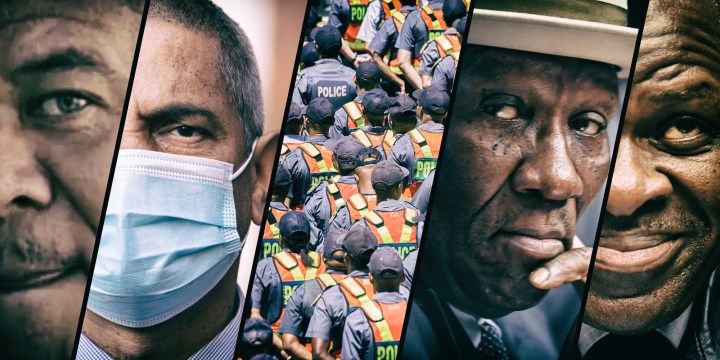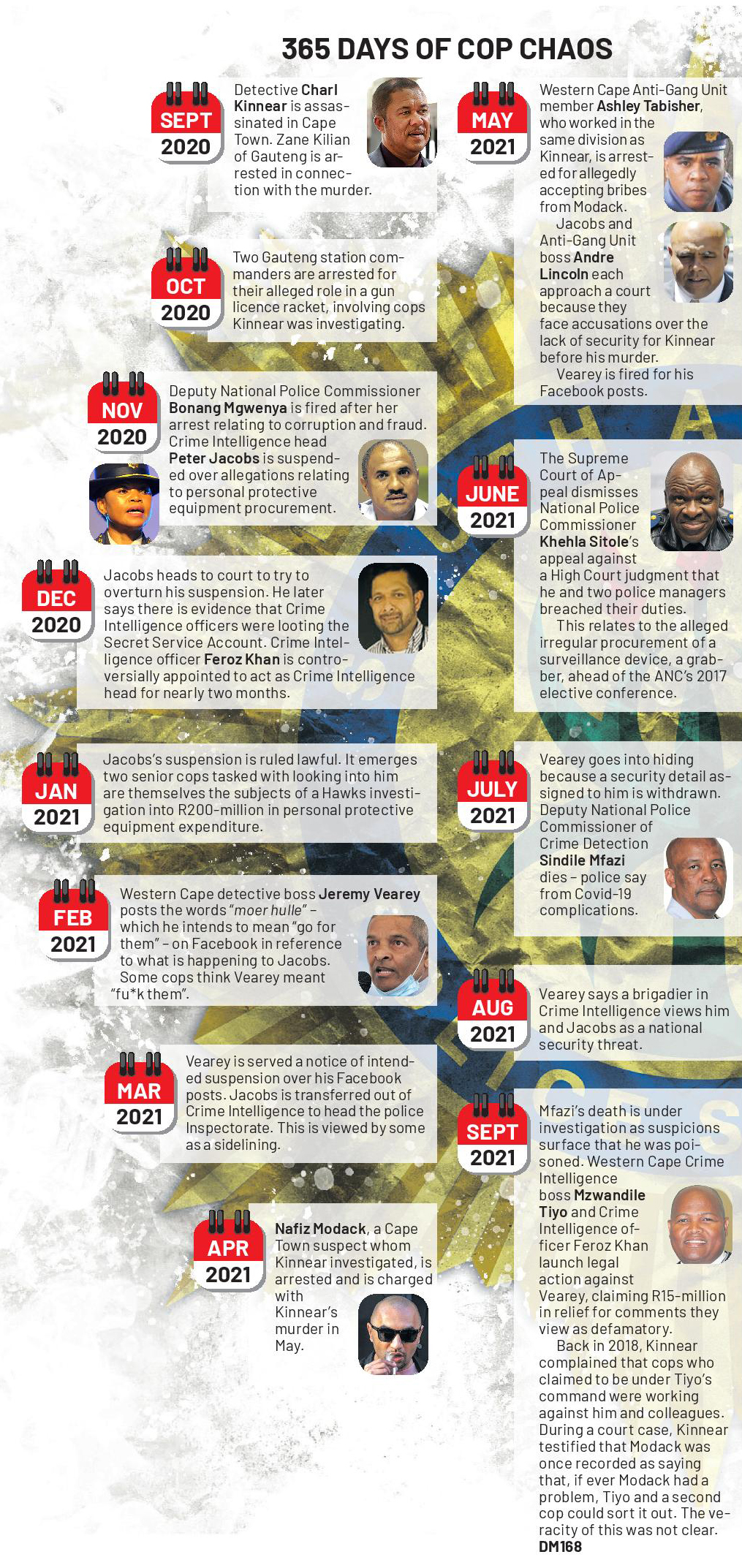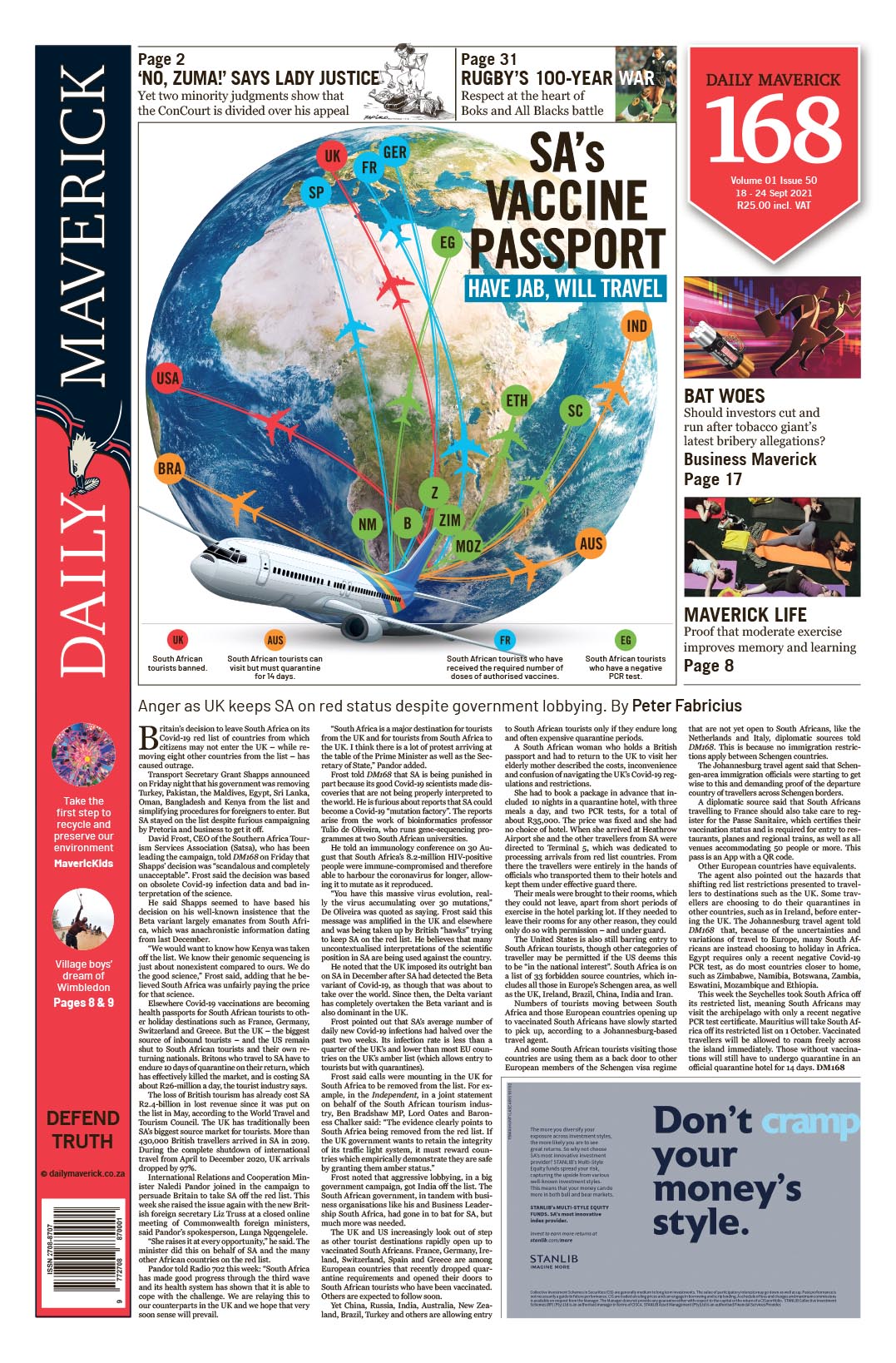DM168 SAPS IN CRISIS
A year after top cop Charl Kinnear’s murder, the SA Police Service is more chaotic than ever

Lieutenant-Colonel Charl Kinnear’s assassination a year ago should have sparked a serious overhaul of the South African Police Service. Instead, the 12 months that followed the murder have been packed with ever-increasing claims of backstabbing and corruption – as well as suspicions of poisoning – among police officers.
First published in the Daily Maverick 168 weekly newspaper.
A year ago, on the afternoon of 18 September 2020, South Africa’s police service suffered a blow to the gut: detective Charl Kinnear was assassinated in a shooting outside his Cape Town home.
His murder, which National Police Commissioner Khehla Sitole described as a “huge loss to South Africa and its people”, ripped through any illusions that SA’s police service was strong and unified, and led to vows that it would be cleaned up.
Zane Kilian, a former rugby player turned debt collector in Gauteng, was arrested a few days after the killing for allegedly tracking Kinnear’s cellphone, but suspicions lingered about who gave the order for the murder.
Aside from investigating critical underworld crimes, Kinnear was among a group of police officers looking into colleagues.
“From the report I have received, this officer has been under threat for some time,” Police Minister Bheki Cele said at the time. “He was provided with police protection but that was withdrawn at some point. Now I want to know what informed that decision. This family deserves to know whether their father was failed and, if so, heads must roll.”
Speaking at Kinnear’s funeral on 3 October last year, Cele said: “We know Kinnear was involved not only in dealing with the criminals but also dealing with our own criminality. We really have to move the bar up among and between ourselves. It’s painful and it’s going to be painful.”
Deputy National Police Commissioner Bonang Mgwenya also spoke at the funeral. Nine days later, Mgwenya was arrested on “charges relating to corruption, fraud, theft and money laundering”, according to a police statement. Mgwenya, the country’s second-highest-ranking police officer, was dismissed in November 2020.
In the year since Kinnear was assassinated – which should have been a watershed moment for the South African Police Service (SAPS) – internal criminality has been tackled, but progress has been overshadowed by accusations of skulduggery.
At the end of November last year, it emerged that national Crime Intelligence boss Peter Jacobs was to be suspended. That seemed to pit Jacobs, originally from the Western Cape and someone who knew Kinnear, against Sitole. Jacobs was indeed suspended over allegations – that he viewed as bogus – relating to personal protective equipment procurement. He tried to overturn his suspension via legal action, but was unsuccessful.
South Africa headed into 2021 with its crucial Crime Intelligence unit in limbo – a hint of what was to come. Early this year, Jacobs managed to halt a disciplinary process against him and was later told he could return to work – not as Crime Intelligence boss, but as Inspectorate head.
Some of his allies viewed Jacobs, who said there was evidence showing gross abuse of the Secret Service Account by Crime Intelligence officers, as being sidelined to move him away from investigations of cops.
Jacobs’s work woes coincided with those of one of his close allies, Western Cape detective boss Jeremy Vearey, who also worked with Kinnear. In March this year, Vearey was served a notice of intended suspension over a series of Facebook posts, made between December 2020 and February 2021, that were mostly linked to Jacobs’s case. Some officers viewed the posts as disrespectful and threatening.
In April, significant arrests were made in Cape Town. Nafiz Modack, whom Kinnear had investigated for several crimes, was subsequently charged with the assassination.
This intense policing period escalated in May. Jacobs approached the Labour Court in Johannesburg to stop a disciplinary proceeding against him relating to misconduct allegations over Kinnear’s lacking security in the run-up to his assassination.
In an affidavit in this matter, Jacobs referred to a complaint Kinnear had made to his bosses back in December 2018: “Members seconded to Crime Intelligence Unit Western Cape as well as co-conspirators of theirs are misusing state property and resources in a personal attack under the pretences that they are investigating [me and other officers, including Jacobs and Vearey].”
Jacobs had labelled this group a “rogue team”. In his affidavit about his being taken to task over Kinnear’s security, he said a failure to act against the group had left Kinnear “illegally pursued, unprotected and thus vulnerable to being assassinated”.
Western Cape Anti-Gang Unit head Andre Lincoln, Kinnear’s boss and seen as being close to Jacobs and Vearey, also faced charges related to Kinnear’s security. He approached the Labour Court in Cape Town about this.
In an affidavit, he said the disciplinary proceedings “are clearly a result of my disclosures against the senior generals for having accused them of failing to fulfil their duties and responsibilities…”
Issues about Kinnear’s security unfolded in May, a month that ended with Sitole signing off on Vearey’s dismissal in the Facebook posts saga. Vearey challenged his firing, leading to more claims among police officers.
In June 2021, Vearey told Daily Maverick that while his dismissal had been dealt with speedily via an expeditious process – which differed from a usual disciplinary process in that no witnesses were called – police bosses were not tackling the critical crime issues affecting South Africa with the same vigour.
Vearey went into hiding in July 2021 when a security detail assigned to him was terminated. He approached the Western Cape High Court to have it reinstated.
The effects of Covid-19 also took a toll on the police service. Deputy National Police Commissioner of Crime Detection Sindile Mfazi, whom Jacobs had accused of bullying, died in July from what police said were Covid-19 complications.
It also emerged in July that a simmering saga involving Sitole, South Africa’s highest-ranking cop, had boiled over. The Supreme Court of Appeal dismissed his appeal against a High Court judgment that he and two police managers had breached their duties in relation to the alleged procurement of a surveillance device, a grabber, ahead of the ANC’s 2017 elective conference. Questions hung over Sitole’s fitness to lead the police.
That was the battered state of the police service when an attempted insurrection exploded in July. In August, a hearing into Vearey’s dismissal resumed. During the proceedings, Vearey hinted at how deeply rooted some policing problems were. He said a Crime Intelligence brigadier viewed him and Jacobs as national security threats to SA, referring to a document that showed this.
It was not the first time Vearey had been viewed as such. In 2002, his job was threatened by allegations of gross insubordination relating to Operation Slasher, an anti-gang project he had headed. Vearey had been transferred from the position. He argued he was moved off Slasher because it was uncovering corruption. It was then that he was reportedly deemed a threat to national security.
In July that year, he said in an interview that members of an apartheid-era policing unit were sabotaging investigations by Western Cape ANC intelligence and security members who had become police officers, Vearey and Lincoln among them. Vearey threatened to produce classified documents relating to the unit’s activities.
“If it means exposing covert operations of the former statutory agencies for which they did not apply for amnesty, we will do so. We have access to … documents that were not shredded in time,” he was quoted as saying.
It was this, presumably, that led to him being seen as a national security threat at the time.
This is where past and present overlap. This month, it emerged that Western Cape Crime Intelligence boss Mzwandile Tiyo and Crime Intelligence officer Feroz Khan had launched legal action against Vearey, claiming a collective R15-million relief for comments he made that they saw as defamatory.
Tiyo was also once a member of the ANC’s department of intelligence and security. Kinnear, in the 2018 complaint to police bosses, claimed officers allegedly linked to Tiyo’s Western Cape Crime Intelligence were working against him and allied cops.
In a court case focused on Modack in 2018, Kinnear testified: “Nafiz Modack states he was dealing with high-ranking police officials and, should there ever be a problem, Tiyo and [former Western Cape detective head Major-General Patrick Mbotho] can sort it out.”
This month it emerged that police were investigating Mfazi’s cause of death, initially said to be linked to Covid-19, but which some suspect could be due to poisoning.
Vearey is facing legal action launched by two Crime Intelligence officers, one of whom was previously fingered by Kinnear.
Crime Intelligence is a messy arena with the controversially transferred head taking the decision to move Jacobs out of the unit – yet the Crime Intelligence lead job was recently advertised, meaning police bosses are moving on.
Presiding over all this is South Africa’s top police officer, Sitole, who is in a precarious position because of his alleged involvement with the grabber saga.
Earlier this month, the police service held its annual commemoration day in honour of police officers and reservists killed in the line of duty over a year. Kinnear’s name was one of 34 engraved on a National Memorial Wall at the Union Buildings in Pretoria.
President Cyril Ramaphosa called for stronger community and police relations.
Cele said: “The deaths of these 34 members should not be in vain. Their loss should remind us all as a nation [of] the importance of community policing partnerships.”
These words are meaningless if police – and those with the power to clean up the police service – do not uphold their oath of office. DM168
This story first appeared in our weekly Daily Maverick 168 newspaper which is available for R25 at Pick n Pay, Exclusive Books and airport bookstores. For your nearest stockist, please click here.























 Become an Insider
Become an Insider
Don’t expect any suspensions / demotions / sackings soon , life goes on , or not in some cases. You have Cressida Dick, but she is really not in the SAPS class.
With a fractured ANC you can’t have a unified Security Service. At least under a Nationalist government the SAP we’re singing off the same hymn sheet ( not excusing the SAP for their behavior just pointing out they were unified in their efforts!)
At the moment our Security Services spend their time fighting political battles instead of helping to maintain law and order and keeping the citizens of this country safe. I for one am no longer happy to pay taxes towards ANC political infighting…..I don’t think I am alone in this!
A mainly criminal organisation run by criminals under the watchful eyes of cr and his anc – what can be expected? See the article in maverick Citizen
…. edited – La Vie en Rose: detailing hundreds of millions of PPE tender criminality.
A fish rots from the head down. Too busy chasing surfers, arresting old ladies walking poodles, beating people in townships and grandstanding about disarming lawfully armed citizens to really concentrate on providing a stable, reliable and efficient service.
What do you expect when a criminal gang like the ANC is in power.